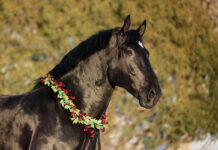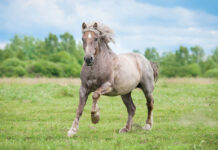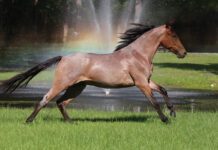 Miniature horses make great companions for full-sized horses and can be a lot of fun for their owners. Make sure your farm is properly outfitted for a mini and be prepared to create a horse care routine appropriate for your pint-sized equine.
Miniature horses make great companions for full-sized horses and can be a lot of fun for their owners. Make sure your farm is properly outfitted for a mini and be prepared to create a horse care routine appropriate for your pint-sized equine.
- Like other equines, minis do best when they are turned out all the time or are given some turnout time every day. If you keep your mini in a stall, make sure that he gets daily exercise.
- Some minis are very easy keepers, and while a pudgy little horse may look adorable, obesity increases the risk of founder, joint problems and equine metabolic syndrome. If your mini is kept on grass, you may need to purchase a mini-sized grazing muzzle to prevent too much weight gain. Adequate exercise will also help control his weight.
- Most good horse fencing will work fine for minis, but check the perimeter to make sure that there aren’t any spots where a small horse could squeeze underneath or in between rails.
- Most regular horse stalls will also be adequate for minis. If you have hanging doors on your stalls, just make sure that they are low enough that your mini can’t escape. You will also need to lower water and grain buckets to an appropriate height.
- Minis require considerably less feed than their full-sized counterparts. Many will do fine on grass or a flake or two of hay each day. If your mini is worked often or is used for breeding, you will probably need to feed concentrate in addition to forage. All horses should have constant access to clean water.
- Minis do not typically wear shoes, but they still need regular farrier care every six to eight weeks to ensure hoof health and prevent lameness issues. You should pick out your mini’s hooves daily to clear out rocks and prevent thrush.
- A companion mini doesn’t necessarily need to be clipped, while minis on the show circuit are often body clipped to maintain a sleek appearance. If you do choose to clip your mini in the winter, you’ll need to outfit him with a blanket on cold days and nights.
- Your mini will need regular visits from an equine vet. When properly cared for, minis often have a lifespan that exceeds the 30-year lifespan of full-sized horses. He’ll need the appropriate vaccines, deworming, dental care and wellness exams throughout his life.
HorseChannel’s Miniature Horse Breed Profile
American Miniature Horse Registry
American Miniature Horse Association
Miniature Horse FAQs





